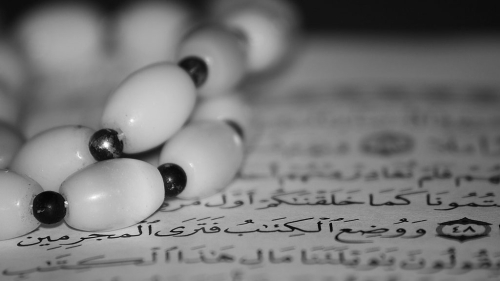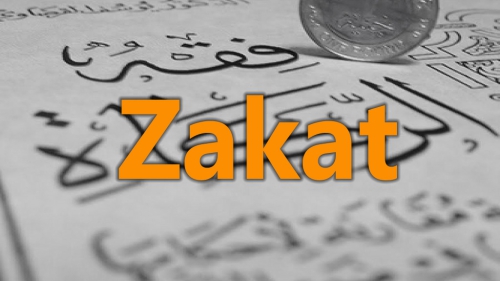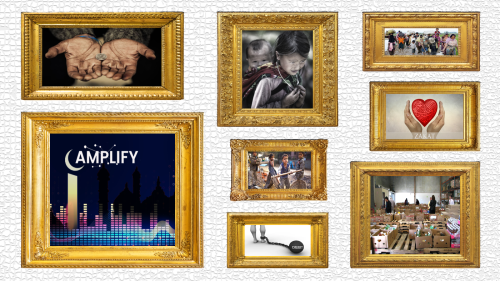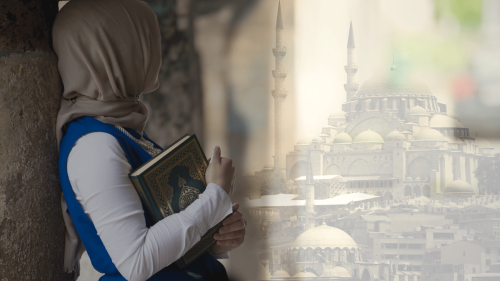True Piety

True piety does not consist in turning your faces towards the east or the west1 - but truly pious is he who believes in God, and the Last Day; and the angels, and revelation,2 and the prophets; and spends his substance - however much he himself may cherish - it - upon his near of kin, and the orphans, and the needy, and the wayfarer,3 and the beggars, and for the freeing of human beings from bondage;4 and is constant in prayer, and renders the purifying dues; and [truly pious are] they who keep their promises whenever they promise, and are patient in misfortune and hardship and in time of peril: it is they that have proved themselves true, and it is they, they who are conscious of God. (Quran 2:177)
1: Thus, the Qur'an stresses the principle that mere compliance with outward forms does not fulfill the requirements of piety. The reference to the turning of one's face in prayer in this or that direction flows from the passages which dealt, a short while ago, with the question of the qiblah.
2: In this context, the term "revelation" (al-kitab) carries, according to most of the commentators, a generic significance: it refers to the fact of divine revelation as such. As regards belief in angels, it is postulated here because it is through these spiritual beings or force's (belonging to the realm of al-ghayb, i.e., the reality which is beyond the reach of human perception) that God reveals His will to the prophets and, thus, to mankind at large.
3: The expression ibn as-sabil (lit., "son of the road") denotes any person who is far from his home, and especially one who, because of this circumstance, does not have sufficient means of livelihood at his disposal. In its wider sense it describes a person who, for any reason whatsoever, is unable to return home either temporarily or permanently: for instance, a political exile or refugee.
4: Ar-raqabah (of which ar-riqab is the plural) denotes, literally, "the neck", and signifies also the whole of a human person. Metonymically, the expression fi 'r-riqab denotes "in the cause of freeing human beings from bondage", and applies to both the ransoming of captives and the freeing of slaves. By including this kind of expenditure within the essential acts of piety, the Qur'an implies that the freeing of people from bondage - and, thus, the abolition of slavery - is one of the social objectives of Islam. At the time of the revelation of the Qur'an, slavery was an established institution throughout the world, and its sudden abolition would have been economically impossible. In order to obviate this difficulty, and at the same time to bring about an eventual abolition of all slavery, the Qur'an ordains in verse 8:67 that henceforth only captives taken in a just war (jihad) may be kept as slaves. But even with regard to persons enslaved in this or-before the revelation of 8:67 - in any other way, the Qur'an stresses the great merit inherent in the freeing of slaves, and stipulates it as a means of atonement for various transgressions (see verses, e.g., 4:92, 5:89, 58:3). In addition, the Prophet emphatically stated on many occasions that, in the sight of God, the unconditional freeing of a human being from bondage is among the most praiseworthy acts which a Muslim could perform.
Translation and commentary by Muhammad Asad
Related Suggestions
http://www.prisonplanet.com/articles/may2007/300507phonytape.htm
I just wish the above 2 brothers would stop fighting and see if they can make positive contribution towards this article.
Ask the Holy Ghost to help you, maybe if it didn't help the pope, he still could help you.
Get real, Edriss, by starting to educate yourself for life in America.
Ma'asalamah!
to brother Hudd.
Alberro is AlEhssan. and the closest word in English to describe Ehssan or Alberr is generousity. "wa Ahssen kama Ahssana Allah elaike"
just take your time and pick dictionary and read the old arab language?
Ehssan comes from Ahssana(you should read the "a" like in Ameen) which is different than Hassan.
righteousness is the closest word to describe Alwara'a which is people who do their best to stay away from any sin and anything who may lead to sin.
you can call yourself not scholar and everybody will agree with you but you have no right to speak about people that you do not know yet.
I feel sorry for the people who learn the language from just hearing... the language spoken always used without deep understanding.
None of us are scholars, but putting our heads together we might serve the truth.
As-Salam alaykum!
Asad translation of the quran in PDF is available here at http://hambra.blogspot.com/2006/03/muhammad-asad-message-of-quran-aka.html
and also at http://geocities.com/masad02. It contains at commentary of Muhammad Asad as well as a incorporated commentary of the "scholars" from previous genearations.
He is also author of some great books, such as Road to Mecca.
Muhammad Iqbal's works are available at http://tolueislam.com/Parwez/BA_Parwez.htm
I highly recommend reading their works.
Wsalamzz
P.S. any mullahs or traditionalist want to debate, email me, but I recommend you know the content of the Quran before doing so.
the arabic word Alberro means AlEhssaan and the closest word in English is the generousity and not piety.
may Allah bless you for the translation. I only tried to help as much as I can. wa Assalam Alaikom
"SMALL KINDNESSES ( Soora-e-Maoon, 107)
Have you seen that who belies deen (as it enjoins human welfare)?
That is he who repels the orphan (i.e. indigent).
And urges not the feeding of the needy.
Ah, woe unto worshipers (That is, 'Musalleen' who call themselves 'Namaazi')
Who are heedless of the real objective of the Salaat (which is the culture of human wefare)
Whose purpose is to make a show of their worship (To impress people with their religiosity)
Yet refuse (avoid) small kindness (selfless human welfare which does not inflate their ego)".
The objective of the verse under discussion is to liberate the human beings from an oppressive ritualism 'Isro ghalaal' as was prevalent in the pre-Islimic Arab society, but the Taghuti Mullah's vested interest does not like this.
the sunnah in how we behave towards others and how we
conduct ourselves. i have come across so many born muslims
who have recently started practising islam but are very
judgemental towards those brothers and sisters who are still lost
in their ways. we need to pray for these brothers and sisters
rather than being critical towards them and realise that Allah is
the guider and the judge.
salaam alaikum

















